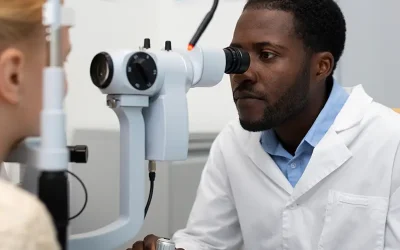Much like regular maintenance keeps your car running smoothly, routine eye examinations are essential for preserving your vision. Instead of waiting for a major issue to occur, scheduling regular eye exams enables the early detection of potential problems, ensuring that any concerns are addressed promptly. For instance, it’s generally recommended to schedule an eye exam every two years—or sooner if you notice any changes in your vision—to ensure early detection and lasting vision health. This guide is designed to help you determine the optimal times to consult an eye doctor for preventive care, explain age-specific exam frequencies, and highlight why early intervention is crucial for maintaining exceptional vision.
Recommended Exam Frequencies by Age Group
Eye health is a lifelong journey, and the frequency of your visits to the eye doctor should evolve with you. Different age groups have different needs when it comes to eye examinations. Let’s break down the recommended frequencies by age:
Infants and Toddlers
For the tiniest members of our community, early detection is paramount. Pediatricians often recommend that infants have their first comprehensive eye exam at around 6 months of age. Early screening helps detect congenital issues or vision abnormalities that could affect developmental milestones. After the initial check-up, follow-up exams are usually recommended between the ages of 3 and 5 to ensure healthy eye development.
School-Age Children
Once children start school, visual demands increase significantly. Clear vision is essential not just for classroom learning, but also for sports and social interactions. It is advisable for school-age children to have an eye exam at least once every two years. However, if there are any signs of visual difficulties or a family history of eye problems, more frequent checks may be necessary.
Adults
As we transition into adulthood, our eyes encounter a variety of stressors—from screen time to environmental factors. Generally, adults should schedule an eye exam every two years. But, if you are over the age of 40 or have underlying health conditions like diabetes, annual check-ups might be a better precaution. Regular examinations during this stage are essential for detecting early signs of age-related issues, such as presbyopia, glaucoma, and macular degeneration.
Seniors
With advancing age, the risk of eye diseases increases. Seniors should be especially vigilant about their eye health. For individuals over 65, annual eye exams are highly recommended. These frequent check-ups ensure that any emerging issues, from cataracts to diabetic retinopathy, are caught and treated promptly, preserving quality of life and independence.
Warning Signs to Watch For
While routine exams are essential, it’s also important to be aware of any warning signs that might indicate a need for more immediate attention. Ignoring these symptoms could lead to complications that might have been preventable.
Common Vision Changes
Have you noticed that your vision isn’t as sharp as it used to be? Maybe you’re struggling to read fine print or notice that your eyes feel tired after prolonged screen time. These changes are common as we age, but they shouldn’t be dismissed outright. Sudden or gradual vision changes might be the first indicators of an underlying problem that needs professional attention.
Symptoms Requiring Urgent Attention
Some eye symptoms warrant a quicker visit to your doctor. If you experience flashes of light, a sudden increase in floaters, pain in your eyes, or a significant change in your field of vision, these could be warning signs of retinal detachment or other serious conditions. In such cases, don’t hesitate—contact your eye doctor immediately.
The Benefits of Regular Eye Check-ups
Regular visits to an eye doctor offer a multitude of benefits that go beyond simply maintaining clear vision. These check-ups are a proactive approach to managing your overall eye health.
Early Detection of Issues
One of the most compelling reasons to have routine eye exams is early detection. Just as a routine health check-up might reveal early signs of high blood pressure or diabetes, an eye exam can uncover issues like glaucoma or cataracts before they progress into something more serious. Early detection often means that treatment can begin sooner, potentially preventing irreversible damage.
Improved Vision Health
Beyond disease prevention, regular eye check-ups contribute to improved overall vision health. They allow your eye doctor to update prescriptions, adjust treatments, and offer advice on reducing eye strain. In a world where our eyes are continually exposed to digital screens and environmental pollutants, these proactive steps can keep your vision sharp and comfortable.
Impact on Long‑Term Vision Health
The cumulative effect of regular eye care is a lasting impact on your vision health. Over time, early interventions and adjustments to your vision care routine can slow—or even halt—the progression of common age-related conditions. Consider the analogy of tending to a garden; consistent care and early attention to weeds and pests can ensure a thriving, beautiful space. Similarly, consistent eye care can help maintain clarity and vitality in your vision as you age, leading to a better quality of life.
Tips for Scheduling and Planning
Now that you understand the importance of timely eye exams, how can you ensure you’re always on top of your eye health? Here are some practical tips for scheduling and planning your eye care routine.
Choosing the Right Eye Doctor
Finding an eye doctor who understands your needs is like finding the perfect guide on a road trip. Look for professionals who specialize in preventive care and have a strong reputation in your community. Personal recommendations, online reviews, and professional credentials can all guide your choice. Remember, your comfort with your eye doctor is paramount, so take the time to find someone who listens and explains everything in a way that makes sense to you.
What to Expect During an Eye Exam
For many, the thought of an eye exam might spark a bit of anxiety. However, understanding what happens during a typical visit can ease those nerves. Most exams begin with a discussion of your medical and vision history, followed by a series of tests that assess your visual acuity, depth perception, and field of vision. Modern technology, such as digital retinal imaging and optical coherence tomography, has made these exams both quick and highly accurate. If you have any questions during the process, don’t hesitate to ask – after all, your eye health is worth every bit of clarity and comfort.
Conclusion
In wrapping up, it’s clear that preventive eye care is an essential part of maintaining not just your vision but your overall quality of life. By scheduling routine eye exams based on your age and being vigilant about warning signs, you are taking an active role in protecting your eyes from serious conditions. Regular check-ups allow for early detection and treatment of potential problems, ensuring that your eyes remain as clear and vibrant as possible. So, why wait for a problem to emerge? Take that step today—schedule an appointment with your eye doctor and embrace a future of better vision.
FAQ: Your questions answered
How often should I get my eyes checked if I have no symptoms?
Even if you feel fine, it is recommended to have an eye exam every two years. However, if you’re over 40 or have certain risk factors, annual check-ups might be best.
What are some early warning signs that I need to see an eye doctor?
Look out for changes in vision clarity, frequent headaches, eye strain, or sudden increases in floaters and flashes. These could signal underlying issues.
Can regular eye exams really prevent serious eye conditions?
Yes, routine exams help detect issues like glaucoma, cataracts, and macular degeneration early on, which can prevent or delay the progression of these conditions.
Is there a special type of exam for children?
Absolutely. Children require age-specific exams to monitor the development of their vision. Pediatric eye exams focus on both the structural and functional aspects of a child’s eyes.
What should I do if I can’t find a reliable eye doctor in my area?
Start by asking for referrals from your primary care physician, checking online reviews, or consulting local healthcare directories to find a well-qualified eye care specialist.



